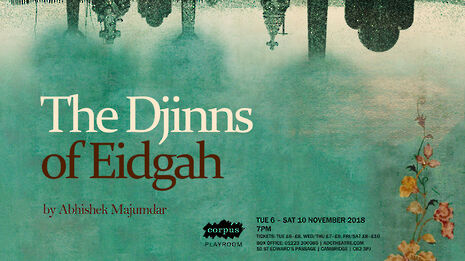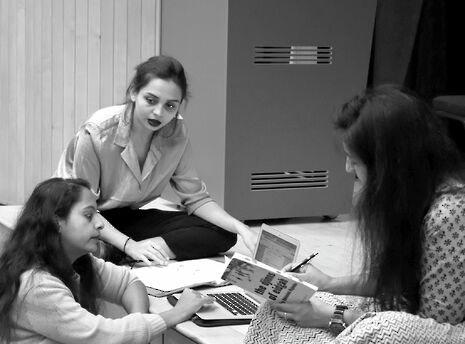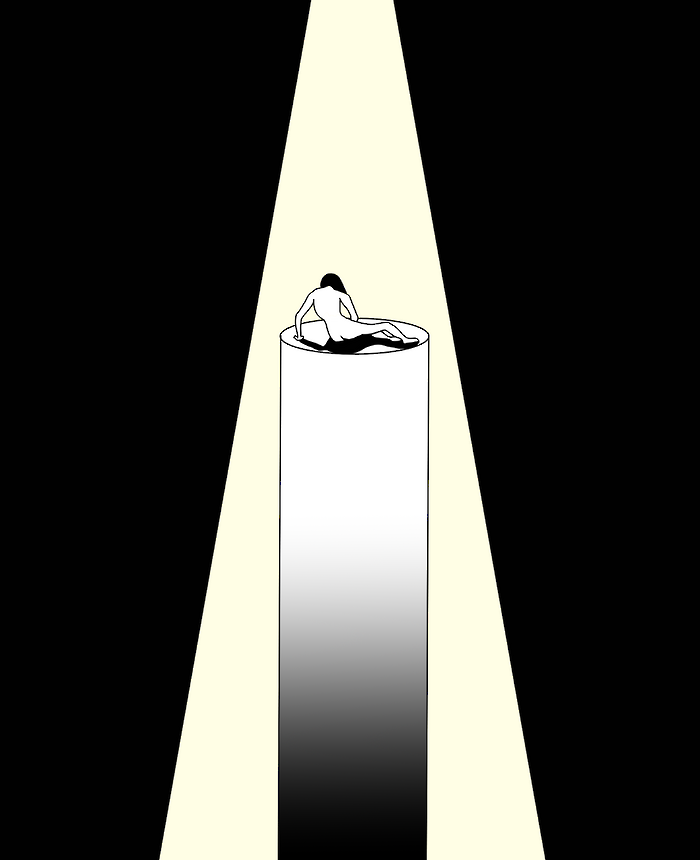The Djinns of Eidgah preview
The play seeks to illuminate the big picture of struggle through the intimate lens of inhabitants in one of the most militarised places in the world

Two friends, two doctors, two soldiers, a traumatised sister and a dead resistance fighter’s haunting spirit in the heavily militarised Kashmir – ‘The Djinns of Eidgah’ weaves an elaborate tapestry of conflict through multiple storylines, reflecting on different takes on life under the closing gaps of freedom and looming violence in an occupied area. Pairs of characters each embody a different take to the situation at Kashmir, as the audience we see them confront the oppressive environment and eventually each other, challenging possible interpretations and attitudes on how to make the most out of life under encroaching military oppression.
Bilal (Anand Joshi) and Khaled (Noor A. Noor) are teenage footballers who dream of becoming famous football stars. Bilal is caught between joining the resistance and providing for his traumatised sister Ashrafi (Eliz Avni) while Khaled is a passionate member in the resistance. Dr. Wani (Claire Chung) and Dr. Baig (Suchitra Seb), a psychiatrist who treats Ashrafi, cannot reconcile their views on Kashmir’s political future and their responsibilities to the clinic and the future generation. Meanwhile, two soldiers (Nusrath Tapadah and Linnea Lagerqvist) find themselves unable to comprehend the nature of their task and each sets out to accomplish their duty in radically different ways. These storylines are laced with Islam myths and folklore, and in particular the Djinn, who appears to the characters as a reminder of the violence and confusion they face.
"Conflicts clash with one another early on in the play, revealing the complexity of the characters’ lives and baring the rawness of their dilemmas"
Watching the rehearsal was watching the story unfurl and tell itself. Conflicts clash with one another early on in the play, revealing the complexity of the characters’ lives and baring the rawness of their dilemmas. Opposing opinions are contested in the dialogue but the tension between national and personal concerns, the tug of war between the personal and interpersonal, emanate from the acting. Khaled’s fervent conviction and Bilal’s torn defence and final outbursts in their confrontations tug at the audience’s heartstrings as one can feel their mounting burden of conflicting concerns pulling them apart, despite their underlying unity in caring about their region. Ashrafi’s character is particularly poignant in her relationship with her brother and her way of navigating the violent surroundings through her trauma-wrecked lens.
After the play, directors Ananya Mishra and Safieh Kabir told me that what attracted them to the play was how it messes with secular binaries and Islamic folklore. Kabir believes that the playwright Abhishek Ajumdar was trying to complicate our understanding of reality through Ashrafi’s distorted yet clear perception of reality and the element of supernaturals in the play: “he’s not saying that God and Djinns are this thing that people believe in, something instrumentalised to cover up all the feelings; he’s positive that they are real”. She sees the use of supernaturals in the play as a means of expressing the surreal quality of life under an extreme and inescapable situation, which also resonates with the use of ghosts in Toni Morrison’s writing about the post-slavery period and the idea that it is impossible to capture the almost fictional horror of reality.

To the audience, the Djinn and the stories told are mere fiction, yet to the characters living in Kashmir, these are part of the stark reality they are learning to comprehend. Kabir sees this as a powerful moment of fragmentation as well as a symbolic moment for the Djinn: “Djinns among certain Muslim population often stand in as a way of remembering across generations, and you can see Djinns used in architecture to bridge generations and tell oral history. The Djinn reappears in the midst of that fragmentation as a symbol for that but also allows the connection of different narratives and histories in the past and the present”.
One piquing point in the play is that the role of an Indian soldier is played by a white actor (Linnea Lindqvist). When asked about this casting choice, Ananya confirms that this was a deliberate decision in the all-BME cast, reflecting the whitewashing of BME characters. What is more, Misrah and Kabir tell me that they want to analogise right-wing Hindu nationalism, as the play takes on both right-wing Hindu nationalism in the Maharashtra state but also more generally; the white actor will become the lens through which the audience will immediately understand the analogies. The discomfort created when the audience see a white actor portray an Indian character is meant to ask the Indian diaspora to rethink cultural appropriation and whether the constructed white lineage of upper caste Hindus are really appropriate lenses through which to analyse India. The play intends to put forward the financial links between right-wing movements in India, and the US and Britain need to be considered in the casting decision.
A point that Misrah and Kabir emphasise throughout the interview is that they do not want to present a flattened, dichotomised, or simplified view of Kashmir in the play. Although they have had to reduce the run-time to an hour and a half, these directors to maintain all of the original implications of the play. The play certainly presents the struggle between national, personal, and interpersonal concerns and dilemmas, propelled forward autonomously rather than subordinated to characters’ emotional struggle, as many works of fiction are. There is an element of universality in the play despite the setting in Kashmir, as the solidarity and respect expressed for the characters are applicable to those in other occupied zones around the world.
‘The Djinns of Eidgah’ is not an emotional plea about Kashmir’s sufferings, but a microcosm of resistance and tension in the complex landscape of an occupied zone. The inclusion of two soldiers as substantive characters demonstrates the play’s intention to do the conflict justice. It is especially commendable to see a nuanced narrative on the role of soldiers and the oppressor in a conflict, putting the passive but equally toxic bureaucratic violence in the spotlight. It is a thought-provoking watch with raw tensions and touching moments of grief and tenderness, inviting you into the conflict-ridden valley of Kashmir and the dashed football dreams of two teenage boys.
 News / Hundreds of Cambridge academics demand vote on fate of vet course20 February 2026
News / Hundreds of Cambridge academics demand vote on fate of vet course20 February 2026 News / University Council rescinds University Centre membership20 February 2026
News / University Council rescinds University Centre membership20 February 2026 News / Judge Business School advisor resigns over Epstein and Andrew links18 February 2026
News / Judge Business School advisor resigns over Epstein and Andrew links18 February 2026 News / Petition demands University reverse decision on vegan menu20 February 2026
News / Petition demands University reverse decision on vegan menu20 February 2026 News / Caius students fail to pass Pride flag proposal20 February 2026
News / Caius students fail to pass Pride flag proposal20 February 2026











